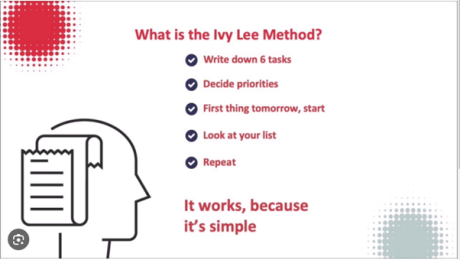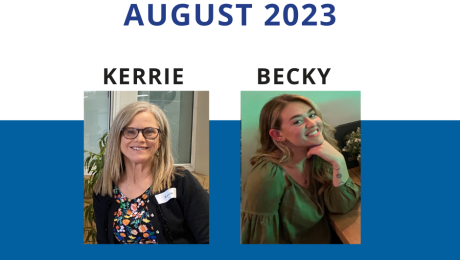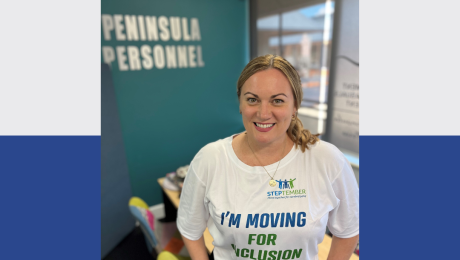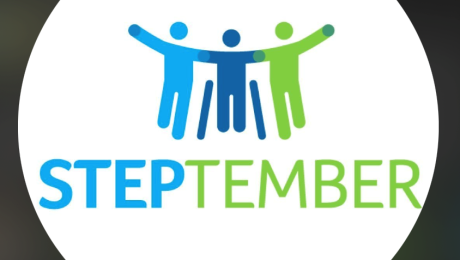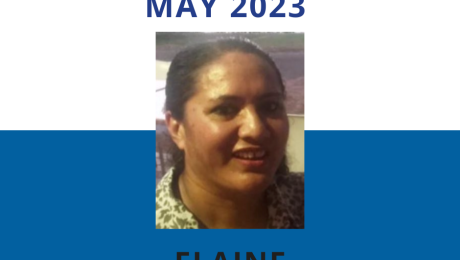What is the Ivy Lee Method?
Want to be more productive at work? Try the Ivy Lee Method.
If you have a role with competing tasks (and let’s face it, who doesn’t these days) and you might go home at the end of the day and think to yourself “I achieved nothing” and the days might feel very long and that you’re going in circles.
It might be time to consider how you’re working, and that might mean switching it up so you can get the most out of each day and go home feeling stronger and that you have things under a bit more control than previous days.
According to a recent study there is still a good percentage of employees suffering from “societal pandemic burnout” (say that five times really, fast) meaning we had met our limits mentally, emotionally, and physically. You know, tired but not normal tired.
I give you The Ivy Lee Method!
The story goes that in 1918, a man named Charles M.Schwab was known to be one of the most successful business owners in the world. He owned a steel corporation and wanted to further innovate his workplace.
To increase productivity, he enlisted the help of a productivity consultant, Ivy Lee to advise him in this. Quite simply it is an easy routine to effectively help with “maximising productivity” and who doesn’t need some of that.
How it works!
What you do, is at the start of your working week and day, you write down 6 of the most critical things you need to accomplish. That’s the rule, no more than six. Write them in order of importance and then simply start working on them. Start on the first task, and do not attempt the next task until it is completed in its entirety.
Anything on that list that’s unfinished by the end of the day (which is inevitable and nothing to beat yourself up about) just moves over to the next day.
Now if you’re “Super-Fly” and storm through those six items halfway through the day, then (you probably don’t need this hack anyway 😊) you make another list of six and get cracking.
Basically, that list is the last thing you do before finishing work for the day, and the first thing you look at before you begin.
It sounds simple, right? But does it work?
For a productivity hack to work, it must be very simple and intuitive. The beauty of the Ivy Lee method is that it allows for those silly little tasks that will inevitably come up and throw your entire day out. It means you can’t vastly overestimate how much you can get done in a day, and it provides a clear focus on what tasks are achievable.
The method removes the friction of starting as the biggest barrier to getting things done can sometimes be starting them. Most of us know the feeling of deciding to work on one task, then finding it too difficult, so starting another, and then wondering if you should be doing something else instead, allowing that process of decision making to take up the whole day.
The method also means you focus on one thing at a time. No multi-tasking, which can often mean dividing your attention 15 different ways and doing a bunch of jobs poorly.
- Published in News from the PP Team
Temp of the Month Award
We had two wonderful temps of the month for September. Congratulations to Simone (pictured) and Melissa who is so dedicated and hardworking and has an amazing eye for detail as well as genuine compassion and care for our amazing fundraisers! Well done. Simone we are so pleased you are enjoying the assignment and team of people you’re working with; the company said you have been fantastic. Always positive, very professional, and proactive. Thanks ladies and congratulations again, a gift pack and certificate are coming your way. #tempwork #award #congratulations #staffaward #tempofthemonth #peninsulapersonnel
- Published in News from the PP Team
Temp of the Month Award
We are thrilled to announce x2 Temp of the Month Awards for August. Join us in congratulating Kerrie & Becky for their outstanding contributions! Below is feedback from their managers.
Working with Kerrie has been an absolute pleasure! She is highly motivated, dependable and always willing to lend a helping hand with whatever is needed. With Kerrie adding it is great to be back working another campaign, I have picked up the systems easily, good team and Laura is lovely!
Becky deserves to be nominated as temp of the month, she is an absolute JET, a great addition to the team and is managing her responsibilities really well. So much so that we would like to continue with her in this role for at least another 3 months.
One of Becky’s tasks was to organise our national conference and our Birthday celebration, both events were a total success. They involved lots of coordination, organisation with vendors, presentation management, hotel liaison, flight management, internal stakeholder management – the list goes on! Becky managed every aspect of both events with a sense of calm, and nothing was to hard a task. She took on all responsibilities and problem solved the whole way to achieve the best outcome. I feel lucky to have such a dedicated ‘temp’ team member in our business!
- Published in News from the PP Team
Can Australian employers stop you working from home?
Here’s what the law says.
In Australia, close to 90% of employers have implemented mandatory in-office days, according to a survey of 300 hiring managers commissioned by recruitment agency Robert Half.
The survey shows 19% insisting on five days a week, 28% on four days, and 26% on three days. Almost a third of respondents reported at least one employee quitting in response.
Particularly for parents and younger workers, working from home is not something they will readily give up.
Which raises the question: can an employer, having first directed you to work from home, now turn around and mandate you don’t?
The short answer is yes, they can in many case….though some people have a stronger case to argue for flexible work, and correct procedures must be followed.
Is it a “lawful and reasonable” direction?
Whether you are employed permanently, as a casual or on a short-term contract, you are required to follow “lawful and reasonable “directions from your employer.
Even if this isn’t stated specifically anywhere, Australian courts have ruled this requirement is “implied” in every employment contract.
A direction to return to the workplace will be lawful and reasonable except in extreme cases-for example, where it is contrary to a government directive or another law. If you can perform your role at home and have a legitimate reason to do so-such as an underlying health issue-you may have grounds to argue a directive to return to the office is not reasonable.
But a detailed and considered plan requiring employees to return to the workplace safely will be lawful and reasonable. Failing to comply with this direction may be a valid reason for disciplinary action, including dismissal.
Is consultation required?
If your work is covered by an award or enterprise agreement, you can collectively assert your right to be consulted, on the basis that a return-to-work order constitutes a “major workplace change”.
The Fair Work Ombudsman says consultation requires giving notice, discussing the proposed changes, providing written information, and giving “prompt consideration” to any matters raised by employees and their representatives.
Even though the employer ultimately doesn’t need consent, the consultation still needs to be genuine and properly consider employees views, following the processes set down in the applicable award or agreement.
What about flexible work arrangements?
If your award, enterprise agreement or employment contract contains “workplace flexibility” provisions, you may have rights to work from home or to make a request.
In addition, the national employment standards under the Fair Work Act give employees the right to request “flexible work arrangements” if they’ve been with the employer for at least 12 months, and:
- Are a parent or carer of a child of school age or younger
- A carer
- Have a disability.
- Are pregnant.
- Are experiencing family or domestic violence or caring or supporting an immediate family or household member experiencing family or domestic violence.
Does that apply to casual work?
Casual employees have similar rights if they have been working regularly and systematically for at least 12 months and have a reasonable expectation of continued work on the same basis.
Reasonable adjustments for employees
The right of review for flexible work arrangement requests, though limited to certain employee categories, could well become a hotly contested area.
If an organisation mandates their workers return to the workplace, the employer needs to provide clear guidelines. If an employee seeks a flexible work arrangement, the employer needs to actively engage with them and give them opportunities to provide supporting evidence regarding any special circumstances.
That way, they can accommodate employees-so far as is practicable-and if required, make reasonable adjustments. If you’re an employee wanting to request flexible working arrangements, such as working from home, or an employer wondering how to handle such requests, you can read more at the Fair Work Commission.
- Published in News from the PP Team
I’m moving for inclusion
STEPtember merch arrived today, we will wear the t-shirt with pride. STEPtember is a fun and inclusive virtual challenge that encourages you to move your way to 10,000 steps a day – whenever, wherever, and however you like – from 1-30 September. Every 20 hours, an Australian child is diagnosed with cerebral palsy. To donate visit this page https://www.steptember.org.au/fundraiser-search #cerebralpalsy #STEPtember #virtualchallenge #donate #charity #workfun #tempwork #recruitment #peninsulapersonnel
- Published in News from the PP Team
STEPtember time
Its nearly STEPtember time, we are proud to be involved in this great campaign year after year, join a community of over 124,000 Australians STEPping it up to help change the lives of people with cerebral palsy. STEPtember is a fun and inclusive virtual challenge that encourages you to STEP UP – whenever, wherever, and however you like – from 1-30 September. Visit https://www.steptember.org.au/ for more information and to sign up. #cerebralpalsy #steptember #fundraising #charity #workfriends #peninsulapersonnel #recruitment
- Published in News from the PP Team
Temp vs. Perm
Hello and Happy Friday, with the start of the new financial year we have seen a spike in temp jobs along with hearing many stories of recent redundancies especially within large organisations. With that in mind there are many different viewpoints on whether or not accepting a temp job is a good idea. Some individuals think of a temporary position as a terrible option, while others think of it as the most ideal one and a great alternative to, well, unemployment. A permanent job, on the other hand, can provide us with security, and maybe too much comfort.
The only way to truly understand the benefits and drawbacks of temporary and permanent jobs is to have a clear picture of both – and that’s what I am going to do!
Below, I will break down the PROS and CONS of each job arrangement, with bullet points to be easy for everyone to read and understand.
TEMPORARY WORK
Temporary work refers to an employment situation where the working arrangement is limited to a certain period of time, which is based in the needs of the employer.
PROS
- Employers can sometimes be more flexible with temp workers in terms of their working hours.
- Gives you the flexibility to jump from one position to another and experience different company cultures and meet new professionals.
- Temporary jobs are ideal for filling in the gaps between long-term positions. Not only will you be able to earn money while looking for your ideal job.
- Can sometimes be more rewarding in terms of salary than a permanent role.
- Temp positions tend to lead to permanent contract.
- Gives you the ability to test the ”waters” before you apply for a permanent role with that employer.
CONS
- If your coworkers suspect you won’t be working there for long, they may be less inclined to form a bond with you – equally, you may feel the same.
- You may be excluded from a lot of business/team related meetings or social gatherings. You likely won’t be eligible for the employer’s benefits and perks.
- The majority of temporary assignments are designed to assist businesses with immediate, short-term needs — you might be asked to leave after your contract agreed time period.
- Higher pressure as you have only a specific amount of time to deliver a service and results.
PERMANENT WORK
Permanent work means that there isn’t a predetermined end date to an employees contract.
PROS
- Permanent jobs frequently come with perks and benefits that are sometimes not accessible in temporary positions.
- In comparison to temp work, permanent positions can provide a better financial security and peace of mind.
- With a permanent job, you can establish a foundation for a successful and fruitful career with a single company. If you do well in a permanent position, you can advance up the corporate ladder—thereby developing your career and earn more money.
CONS
- Permanent work may become monotonous.
- It may make you feel trapped in a routine, especially if you perform the same tasks on a daily basis.
- Permanent employment is highly restricting, especially for people who desire to continue exploring other fields, working in other positions, and obtaining additional knowledge and skills.
- People that are into permanent work are more likely to become too comfortable and never take the next step in their career or professional development.
When it comes to temp vs. perm hire, the truth is that both have their own set of advantages and disadvantages. Temp employment, as you can see, provides a lot of benefits, but they may not be suited for everyone. It’s up to you and your LIFESTYLE to decide which one is most ideal for you.
- Published in News from the PP Team
Temp of the Month
Elaine is a repeat offender having won this award before, last one back in June 2021. Elaine is someone who is repeatedly requested back by many of our clients, and this has been the case for a number of years now. Elaine simply gets on with her work and can easily work autonomously & with very little training or direction. I wish I had lots more “Elaines” working as part of the PP temp team, her work ethic is second to none, this award is well deserved, thank you Elaine! The Clients always have great feedback. #recruiter #tempofthemonth #northernbeaches #awards #congratulations
- Published in News from the PP Team
Temp of the Month Award
Sara is new to the team but has hit the ground running with wonderful feedback from our clients, one of them say “We have had many temps working for us over the last few weeks and Sara was a standout, she was a pleasure to work with and showed a keen interest, she was kind and helpful, picked up the assembly work easily, adapted to the work in 2 different warehouses and environments and to different staff everyday she was on site’’ Congratulations’ thank you and well done Sara for being a standout and representing PP so well, she will receive a gift pack and certificate of appreciation. #tempofthemonth #tempwork #warehousework #assemblywork #staffaward #recruitment #resume #casualwork
- Published in News from the PP Team
<strong>Cover letters the good and the bad</strong>
Need to come up with a good covering letter? When it comes to writing a winning cover letter, it’s often the little things that add up to make a big difference. A cover letter is all about making a good first impression and giving your job application the best chance of making progress. A well written one will help encourage a potential employer to read through to your resume and get in touch to find out more or set up an interview.
I have always said that often resumes can be quite clinical and really that is their job (pardon the pun) you’re essentially listing duties and experience that hopefully relates to the role you’re applying for, it’s not supposed to be romanticised reading 😊. In my early career potential employees weren’t necessarily adding a “Profile” which is now commonplace as it is like a summarised version of what essentially is a covering letter.
I’m not saying you should alter that, as some job applications don’t allow for you to download your covering letter so it is a good way to highlight your personality adding a profile, but if given the opportunity to download a covering letter I would recommend you do so.
I have included two examples of covering letters I sourced to show you one that hits the mark, and one that doesn’t quite make it.
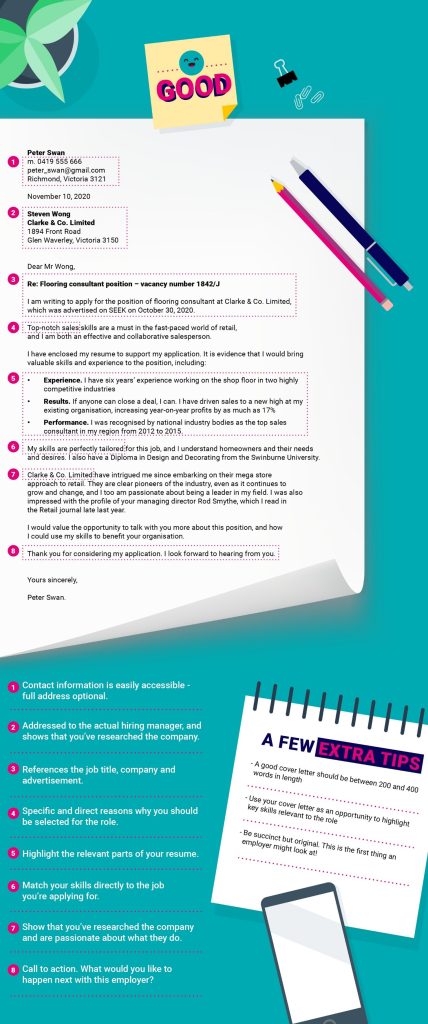
Highlights that make this one a little ripper!
1: Contact info is easily accessible-full address optional (I would just put your suburb)
2: Addressed to the actual hiring manager and shows that you have researched the company.
3: References the job title, company, and advertisement.
4: Specific and direct reasons why you should be selected for the role.
5: Highlight the relevant parts of your resume.
6: Match your skills directly to the job you’re applying for.
7: Show that you’ve researched the company and are passionate about what they do.
8: Call to action. What would you like to happen next with this employer?
A few extra tips!
· A good cover letter should be between 200-400 words in length.
· Use your cover letter as an opportunity to highlight key skills relevant to the role.
· Be succinct but original. This is the first thing an employer might look at.

Elements that make this one a little sub-standard
1: Make sure you include all your contact information, including email and contact number.
2: Always address your cover letter using the name of the hiring manager if possible
3: This example doesn’t include the job title or company name, which could suggest its generic, and has been sent to multiple employers unchanged.
4: You need to explain why you are applying for the role.
5: Check your spelling and grammar!
6: Only include information that is relevant to the role.
7: Put forward a compelling case as to why you’re suitable for the role.
8: Only focus on your positives and why you would be a good fit for the role.
9: Never say you don’t know much about the company. Do your research.
- Published in News from the PP Team

